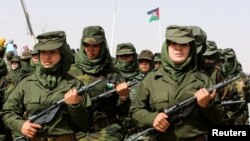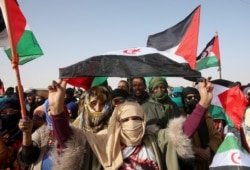Generations of young Sahrawis have grown up in Algeria's remote desert refugee camps largely forgotten by the outside world and now see no prospect of an independent homeland in Western Sahara except through a new war their leaders say has already begun.
Their fears that the quest for statehood had become a lost cause grew when U.S. administration of former president Donald Trump recognized Morocco's claims to the vast, sparsely populated territory in December.
"We have not received any peaceful results," said Brahim, a Sahrawi man taking part in a recent parade by the group's Polisario Front independence movement in Tindouf, close to Algeria's border with Western Sahara.
"It's why we must return to the armed struggle," he said.
In November, the movement said it was leaving a three-decade cease-fire with Rabat and has announced frequent attacks since then on Moroccan forces along the desert frontier.
Morocco has said the Polisario attacks, in remote areas where it is hard to verify either side's claims, have caused it no casualties and caused limited damage.
The Sahrawi government-in-exile based in Tindouf has called on U.S. President Joe Biden to reverse his predecessor's decision to accept Moroccan sovereignty over Western Sahara.
"Years of peace have not worked. Now it is time to return to war and we women of Western Sahara will sacrifice our children for the cause," said Mbaraka, 65, in the Awserd camp in Tindouf.
The dispute dates to the time when the territory, rich in phosphates and fishing grounds, was a Spanish colony, resisted by the Polisario Front with Algerian backing but also claimed by Morocco.
When Spain quit in 1975, Moroccan troops marched in and the Polisario, with Algerian support, turned its guns on what it saw as a continuation of colonial rule by a different country.
Its limited guerrilla successes were curtailed in the 1980s when Morocco built a long sand wall in the desert enclosing about four-fifths of the territory within its own control and leaving tens of thousands of refugees on the other side.
The two agreed to a cease-fire in 1991 but, as the conflict froze and negotiations over a permanent settlement stalled, the refugees stayed in the camps.
Morocco regards the region as part of its territory and is prepared to offer nothing beyond limited autonomy. The Polisario and its government in exile seek independence.
Tindouf, deep in the Sahara and farther from Algiers than Paris, is home to several camps housing more than 165,000 refugees. They live in windswept concrete or mud shelters with few jobs and little to hope for.
"The solution is fire and struggle to liberate the land," said Mohamed Salem, another Sahrawi man in the parade.






